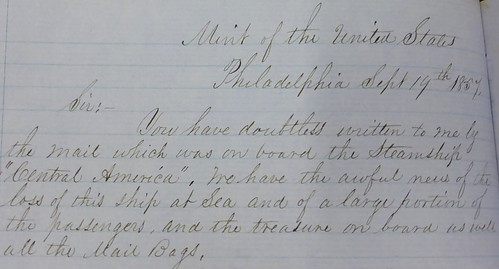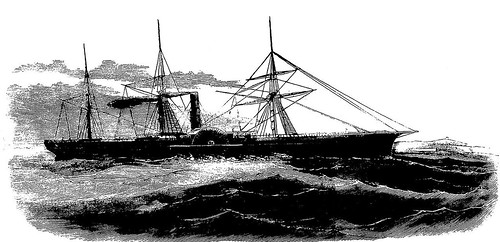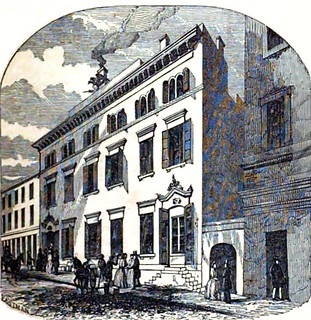
PREV ARTICLE
NEXT ARTICLE
FULL ISSUE
PREV FULL ISSUE
Researcher Dan Owens submitted this original article on the branch mint documents lost in the sinking of the S.S. Central
America. -Editor
In 1857-1858, after the S.S. Central America foundered in a hurricane off the Carolinas on September 12th, the Director of the United States Mint, James Ross Snowden, and the San Francisco Branch Mint Superintendent Charles H. Hempstead exchanged several letters which in part cited the wreck. The main focus of their discussion revolved around handwritten copies of key San Francisco Branch Mint records that were lost with the ship. The date of August 20th referred to in the letter excerpts, marked the morning that the steamship S.S. Sonora departed from her berth in San Francisco Bay and headed down to Panama. Her valuable cargo included over 400 passengers, the twice-monthly California gold treasure shipment and mail bags. The first leg of the passage by sea ended with a quick trip ashore and a crossing by light rail from the Pacific side of the Isthmus to Aspinwall on the Caribbean Sea where the S.S. Central America lay in wait for the voyage back to New York. The Melter & Refiner cited in the letters was Agoston Haraszthy who was accused of a $152,000 shortfall of gold in the Branch Mint's account books. The following excerpts are from Snowden writing to Hempstead. Mint of the United States Sir: I had expected by this steamer to receive your final report of the conclusion of the settlement of the late Melter & Refiner's account, and also the estimates for the next fiscal year. In case your reports came forward by the last mail (viz. 20th ultimo.). I have to request that you will send me duplicates (if not already done) by the earliest opportunity...” The Bullion Fund cited in the following correspondence gave the Branch Mint the power of paying coin to its depositors as soon as the value of their gold deposits were determined by assay. This was critical in California's high interest rate environment, where wasted time was lost money. Most miners, merchants and bankers in need of coin on the exigencies of steamer day could not afford to wait while their gold deposits sat in line waiting to be coined. Funded by the U.S. Treasury, the Bullion Fund was withdrawn during the financial crisis of 1857.  Mint of the United States Sir:  Mint of the United States Sir “It is greatly to be regretted that the accounts forwarded by the “Central America” have been lost . The manner in which you propose to supply them is all that can be done; the employment of an additional temporary clerk is certainly proper...”  Mint of the United States Sir: The fact you notice of finding gold in the rubbish carted from the Branch Mint is very remarkable, and indeed startling. But Mr. Haraszthy's operations were of such a character as to prepare one for almost anything. I therefore am not surprised. It shows gross carelessness or something worse. The accounts of your Branch Mint for the 2nd & 3rd quarter of 1857 (lost with the steamer “Central America”) are in course of examination here (at the request of the auditor) preparatory to their transmission to Washington. I may state that a subpoena was served on me recently to attend the trial of Mr. Haraszthy on the part of the defendant, and bring certain papers with me. Of course I cannot respond personally to the subpoena, but by next mail I will forward to you the papers asked for and request you to hand them to the court.” Very Respectfully Charles H. Hempstead Esq. As Robert Leonard pointed out to the author, the mint was churning out a million dollars or more in gold coins every month. Yet they refused to pay overtime to the clerks hired to reproduce the important Branch Mint records lost in a tragedy. In the end, it was found that Haraszthy did not owe the government a single cent. The bulk of the Mint's losses had occurred by running the Refinery day and night to satisfy depositor demand. Under this heavy work load, fine gold was being drawn up the Refineries chimneys and settling on the Branch Mint's roof and the roof tops of nearby buildings. Harazthy went on to become a famed agriculturalist in California with extensive vineyards under his watch. He passed away in 1869 in Central America, believed to have been snatched by an alligator from the bank of a river in Nicaragua or perhaps he drowned. His body was never found and may have simply been washed out to sea. Note that although records were lost with the ship, the Mint thankfully had copies, as inferred from the Jan. 4 1858 letter.
-Editor
Dan Owens adds: The 2nd and 3rd quarter San Francisco Branch Mint accounts must have been re-copied by the SFBM clerks and successfully re-sent to Philadelphia on another steamer. Also see the December 4, 1857 letter acknowledging receipt of duplicates of certain documents. THE BOOK BAZARREWayne Homren, Editor The Numismatic Bibliomania Society is a non-profit organization promoting numismatic literature. See our web site at coinbooks.org. To submit items for publication in The E-Sylum, write to the Editor at this address: whomren@gmail.com To subscribe go to: https://my.binhost.com/lists/listinfo/esylum All Rights Reserved. NBS Home Page Contact the NBS webmaster 
|